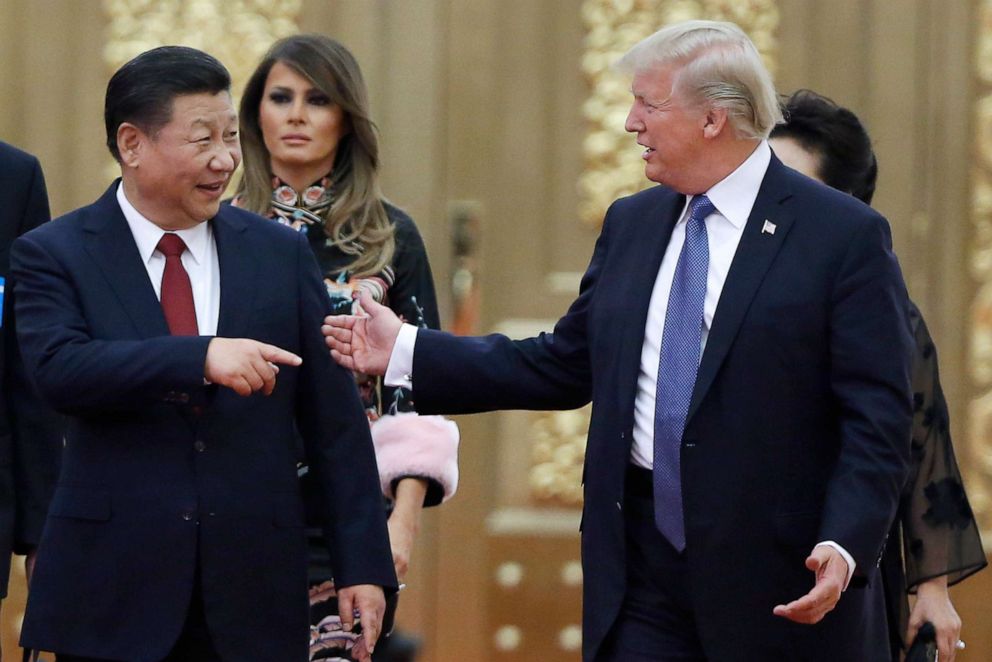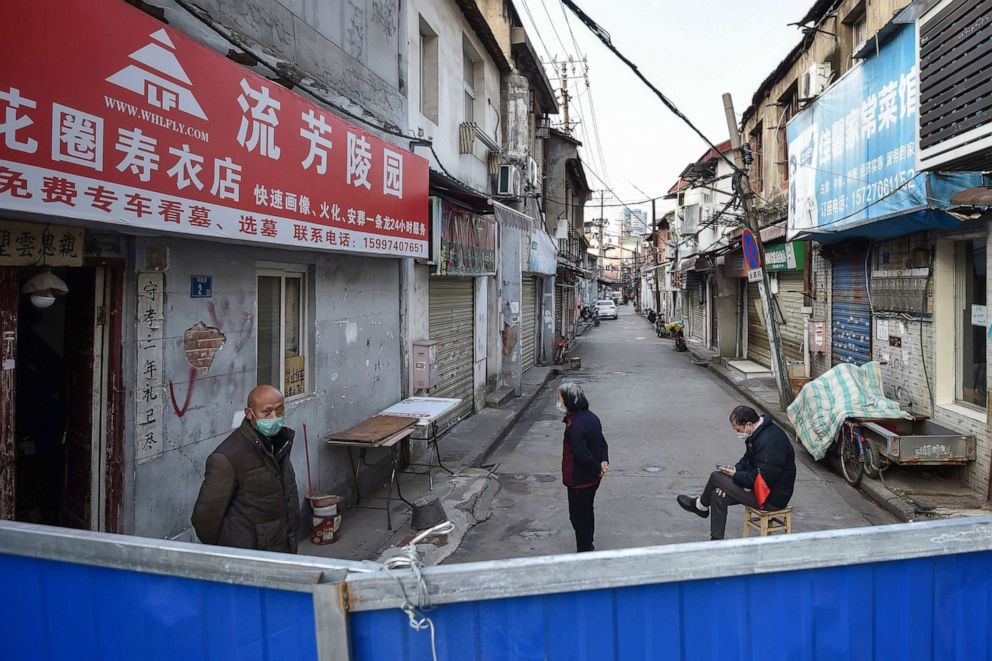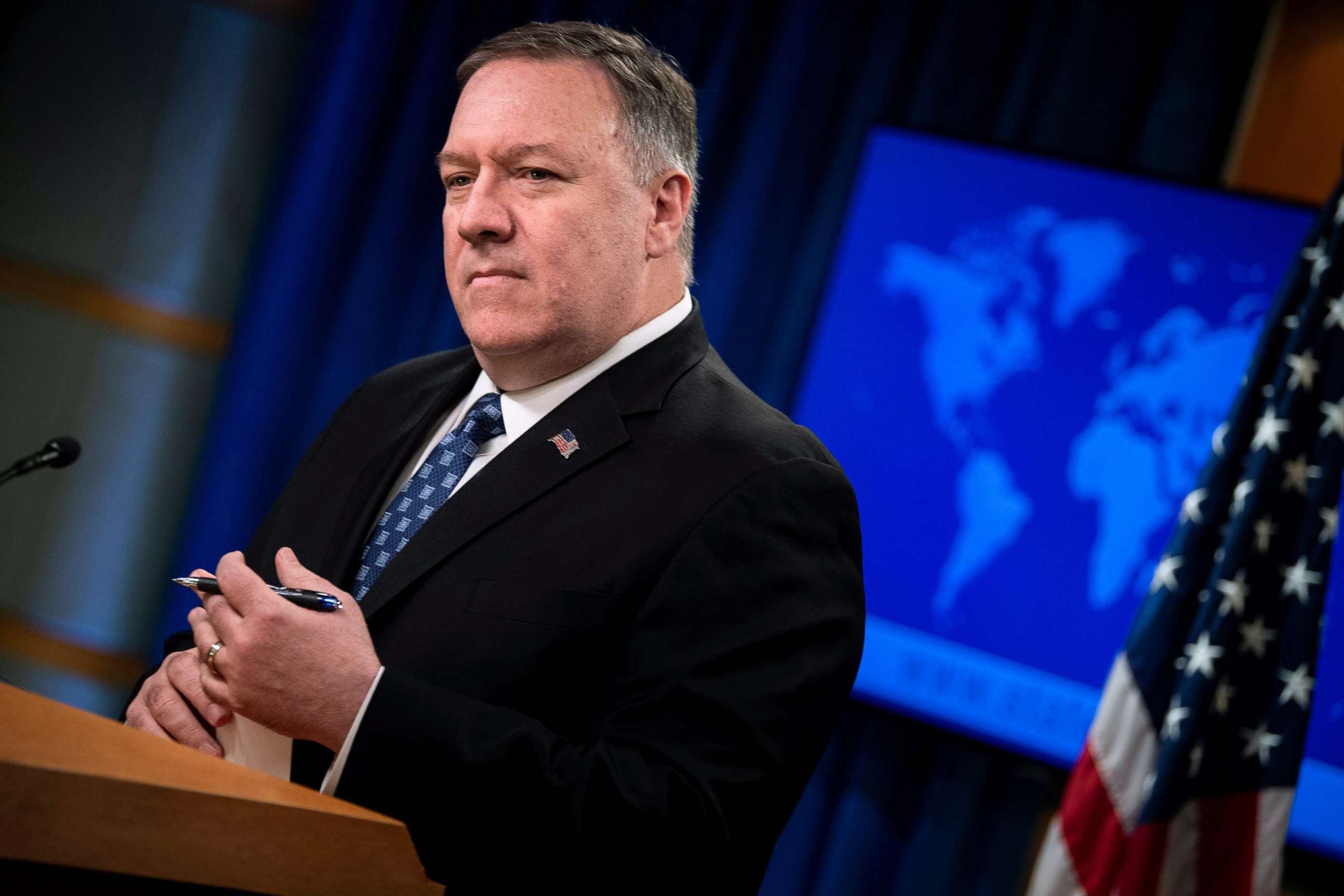Pompeo accuses China and Iran of censoring information about coronavirus outbreaks
Pompeo's comments are at odds with President Trump's praise for China.
As the novel coronavirus continues to spread around the globe, Secretary of State Mike Pompeo on Tuesday accused the governments of China and Iran of censoring information about the outbreaks in their countries and putting the rest of the world at greater risk of its spread.
The top U.S. diplomat's sharp tone towards Beijing was matched by Health and Human Services Secretary Alex Azar, who told Congress on Tuesday that the world is not getting reliable data out of China on issues like mortality rates.
But President Donald Trump seems to be out of sync with both of his Cabinet members and other top officials, praising Chinese President Xi Jinping and his government's handling of the outbreak even as his own administration's response comes under fire from Republican and Democratic members of Congress.

"Censorship. It can have deadly consequences," Pompeo said Tuesday at the State Department. "Had China permitted its own and foreign journalists and medical personnel to speak and investigate freely, Chinese officials and other nations would have been far better prepared to address the challenge."
The flow of accurate information out of China, he added, is critical to assisting not just the Chinese people, but also "citizens across the world." He called on all governments to "tell the truth about coronavirus and cooperate with international aid organizations."
Testifying before the Senate Appropriations Committee, Azar said the administration is also uncertain if the data provided by China on the novel coronavirus outbreak has been full and transparent.
But both of those were at odds with Trump's own remarks just two days ago, praising Xi for "working very, very hard" and "doing a very good job."
"It's a big problem, but President Xi, he's working very hard to solve the problem, and he will solve the problem," Trump told reporters at the White House Sunday.
Trump also showered praise on his own administration's response in the U.S., saying Tuesday in India, "We have very few people with it. ... We're really down to probably 10. Most of the people are outside of danger now."
There have been 57 confirmed cases of the virus in the U.S., with three now released from hospital and no longer thought to be contagious. The majority of those -- 43 of the 57 -- are Americans repatriated from the Diamond Princess cruise ship or Wuhan, China, the epicenter of the outbreak. Only 14 are individuals that either arrived in the U.S. from China and checked into a hospital or caught the virus in the U.S. from a loved one who had traveled overseas.
But officials from the Centers for Disease Control and Prevention warned Tuesday that the most recent data suggests another level of virus spread globally, with cases identified in more countries now and another level of virus spread.

"The data over the last week has raised our level of concern," said Dr. Nancy Messonnier, director of the CDC's National Center for Immunization and Respiratory Diseases.
During his news conference in India, Trump also said the U.S. is "very close to a vaccine."
But his acting Homeland Security Secretary Chad Wolf told Congress Tuesday the U.S. was at least "months" away from developing one, with other advisers testifying one was still a full year away.
The various answers vexed Republican Sen. John Kennedy, who told Wolf his "numbers aren't the same as the CDC's. ... Don't you think you oughta contact them?"
Trump's administration has requested $2.5 billion from Congress for emergency supplemental funds to combat COVID-19, the virus's formal name. That funding would come from a $1.25 billion emergency cash requested from Congress as well as reprogramming existing money, including money Congress allocated to fight Ebola.
Democrats condemned the move as both insufficient to deal with the crisis and a short-sighted effort "to steal funds dedicated to fight Ebola," in the words of Sen. Chuck Schumer, amid the second largest outbreak of that deadly disease still lingering the Democratic Republic of Congo.

The request "is indicative of his towering incompetence and further proof that he and his administration aren’t taking the coronavirus crisis as seriously as they need to be," the Senate Democratic Minority Leader added Monday.
It's not just Democrats, however, who have challenged the administration's response. Chair of the Senate Appropriations Committee, Sen. Richard Shelby, R-Ala., told Azar the administration's "request... is low-balling it possibly, and you can't afford to do that. ... If you low-ball something like this, you'll pay for it later."
Trump's top diplomat for Europe and his State Department also warned that Russia was spreading disinformation about the novel coronavirus outbreak on Saturday. Acting Assistant Secretary of State for Europe Philip Reeker and the agency's Global Engagement Center, which combats terrorist propaganda and foreign government disinformation, told AFP news agency that thousands of Russian-linked social media accounts are actively spreading alarm about the outbreak in a coordinated effort, including accusing the U.S. of creating the virus.
Pompeo said nothing about Russia's role Tuesday. But he did attack Iran's government for censorship as well.
"The United States is deeply concerned by information indicating the Iranian regime may have suppressed vital details about the outbreak in that country," he said, noting Iran is second to China in COVID-19 deaths.
Dr. Iraj Harirchi, the head of Iran's counter-coronavirus task force, tested positive for the virus himself, authorities announced Tuesday -- one day after he appeared at a news conference downplaying the danger posed by the outbreak in Iran and opposing a quarantine of Qom, the city with the largest number of infected patients and fatalities in Iran.



